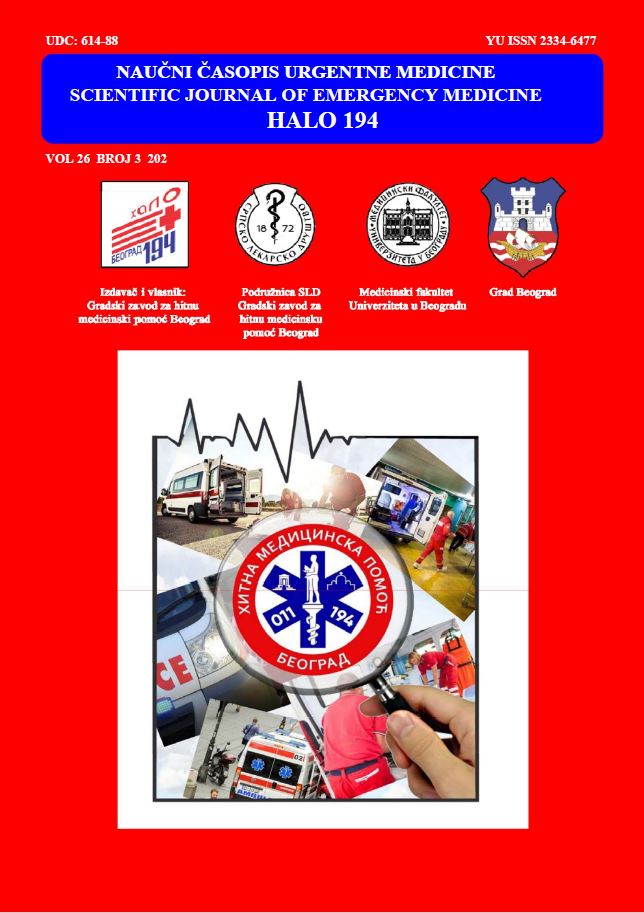Adolescents' information and personal experiences regarding contraception
Abstract
Introduction: Contraception is the most favorable method in family planning. Prevention of unwanted pregnancy is important both from the aspect of preserving health, and from the aspect of wider preventive and social significance.
Aim: To examine the information and personal experiences of adolescents regarding contraception.
Methods: The research was conducted in the form of a cross-sectional study. As a research instrument, questionnaire for adolescents, which assesses their level of information about the importance of contraception, as well as personal experiences. The study included a sample of 120 students, the sample is intentional, the study was conducted at the Faculty of Health and Business Studies in Valjevo, Singidunum University, in the period April-May 2019. Participation in the study was voluntary and anonymous, the research was approved by the competent authorities of the institution.
Results: Descriptive statistics methods were used in the analysis. Respondents in the observed sample were aged 19 to 23 years, the largest number of respondents are female (83%) and male 17%. Most of the respondents were informed about the methods of mechanical contraception and the use of condoms. The most commonly used contraceptive during sexual intercourse is a condom (63%). A large number of respondents (40%) believe that adolescents should be more informed about contraception.
Conclusion: The results of the research indicate the need for a greater level of education about the methods and importance of contraception. It is necessary to intensify health education work in cooperation with health institutions, schools, higher education institutions and the entire community.
References
2. Đurđević S. Ginekologija. Novi Sad: Univerzitet u Novom Sadu, Medicinski fakultet; 2019. 171-189.
3. Jevtić M, Nikolić E. Javno zdravlje za student stomatologije. Novi Sad: Univerzitet u Novom Sadu, Medicinski fakultet; 2011. 30-31.
4. Kekuš D. Zdravstveno vaspitanje. Beograd: Autorsko izdanje; 2009. 265-267.
5. Hadžimehmedović A, Jahić M, Muratović S. Znanje, stavovi i praksa mladih u Bosni i Hercegovini relevantni za reproduktivno zdravlje. Medicinski pregled. 2017; 70(9-10):289-296.
6. Cvetković A. Reproduktivno zdravlje mladih - usmerenost ka zajednici. Opšta medicina. 2016; 22(1-2):25-35.
7. Veljković M, Radulović O, Veličković D. Obaveštenost niških studenata o hitnoj kontracepciji. Acta medica Medianae. 2014; 53(1):15-18.
8. Srećković M, Bogdanović-Vasić S, Karić S, Aleksić U, Banovac M. Procena znanja i stavova studentkinja strukovnih studija za vaspitače o hitnoj kontracepciji, Srbija. Sestrinska reč. 2019;22(79):7-12.
9. Guzzo K, Hayford S. Adolescent Reproductive and Contraceptive Knowledge and Attitudes and Adult Contraceptive Behavior. Maternal and Child Health Journal. 2018;22(1):32-40.
10. Bjelica A, Trninić-Pjević A. Pregled identifikovanih faktora koji utiču na upotrebu kontracepcije. Medicinski pregled. 2008; 61(3-4):151-155.
11. Ott M, Sucato G. Contraception for Adolescents. PEDIATRICS. 2015;134(4):e1257-e1281.
12. Wit A, Booij S, Giltay E, Joffe H, Schoevers R, Oldehinkel A. Association of Use of Oral Contraceptives With Depressive Symptoms Among Adolescents and Young Women. JAMA Psychiatry. 2020;77(1):52.
13. Turnbull G, Scott R, Mann S, Wellings K. Accessing emergency contraception pills from pharmacies: the experience of young women in London. BMJ Sexual & Reproductive Health. 2020:200-339.
14. Hsu R, Tavrow P, Uysal J, Alterman A. Seeking the female (internal) condom in retail pharmacies: Experiences of adolescent mystery callers. Contraception. 2020;101(2):117-121.
15. Stanojević M, Stanković L, Selimi A, Kraljević N, Popović I, Popović J. Seksualna aktivnost, upotreba i poznavanje metoda kontracepcije među srednjoškolcima Niša i Preševa. Acta medica Medianae. 2019; 58(3):40-48.
16. Mitrašinović D, Radovanović S, Kocić S, Đonović N. Stavovi i ponašanje studenata Medicinskog fakulteta Kragujevac u vezi sa reproduktivnim zdravljem. Materia medica. 2009; 25(1):5-8.
- Autori zadržavaju autorska prava i pružaju časopisu pravo prvog objavljivanja rada i licenciraju ga "Creative Commons Attribution licencom" koja omogućava drugima da dele rad, uz uslov navođenja autorstva i izvornog objavljivanja u ovom časopisu.
- Autori mogu izraditi zasebne, ugovorne aranžmane za neekskluzivnu distribuciju članka objavljenog u časopisu (npr. postavljanje u institucionalni repozitorijum ili objavljivanje u knjizi), uz navođenje da je članak izvorno objavljen u ovom časopisu.
- Autorima je dozvoljeno i podstiču se da postave objavljeni članak onlajn (npr. u institucionalni repozitorijum ili na svoju internet stranicu) pre ili tokom postupka prijave rukopisa, s obzirom da takav postupak može voditi produktivnoj razmeni ideja i ranijoj i većoj citiranosti objavljenog članka (Vidi Efekti otvorenog pristupa).

